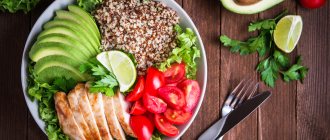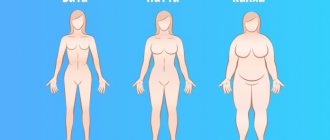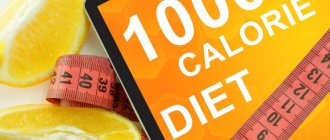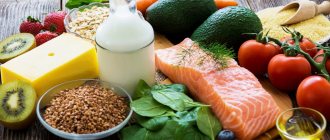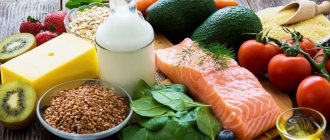In this article we will tell you:
- The concept of rational nutrition
- Basics of rational nutrition
- Rules for rational nutrition
- Rational diet
- Children's nutrition
- Rational nutrition standards
- Energy value of food
- Recommendations for a balanced diet
It has long been known that the primary role in ensuring the quality of our life is not played by genetics (although its influence, undoubtedly, cannot be denied), but rather by our image and style of behavior, as well as eating habits. Not only the functioning of our single integral system called the body, but also the health of subsequent generations will largely depend on how we eat.
Reproductive, hormonal, digestive - there are still no systems on which diet would not have a significant impact: just as the hands of a dial describe the same circles, so everything invariably revolves around what we put in our diet and in what quantity. mouth.
But how not to force yourself into the framework of prohibitions and conventions - in fact, do those same standards of healthy eating exist? How not to chop wood on the way to creating a rational diet and, instead of the expected super effect in the form of toned, elastic skin, beautiful relief and the absence of fatty spaniel ears hanging from the sides, not to aggravate existing problems? Let's figure it out.
The concept of rational nutrition
Balanced diet
- This is not a simple diet balanced in micro- and macronutrients. This is a complete diet that satisfies all the body’s energy needs, tailored to meet age and gender characteristics, the presence of chronic or concomitant diseases, genetic disorders and enzymopathies.
This concept cannot be specified - it always remains purely individual in relation to each person. After all, what is “rational” for one patient may not only not be suitable, but also be extremely dangerous for another: for example, although a 3-times-a-day diet is considered the most physiological, it is fundamentally unsuitable for a patient with adrenal depletion, not not to mention the extreme manifestation of this condition - Addison's disease.
In addition, genetics is also important: for example, the presence of defects in the genes of the folate cycle entails a violation of the utilization of the well-known and quite sensational amino acid homocysteine - and such people are advised to limit animal products containing a precursor in the reactions of its synthesis.
On the other hand, a purely plant-based diet is also contraindicated in case of polymorphisms in other genes - in this situation, vegetarians and vegans are at risk not only for vitamin B12 deficiency, but also for many others. So, say, if the transition of carotene, a precursor of vitamin A, which is concentrated in plant products, is disrupted, you can eat a kilogram of carrots - but this will be of little use (at least in the context of the formation of retinol).
Rational nutrition is the main factor in a healthy lifestyle.
Rational nutrition (from the Latin word rationalis - “reasonable”) is physiologically complete nutrition for healthy people, taking into account their gender, age, nature of work, and climatic conditions.
A balanced diet helps maintain health, resistance to harmful environmental factors, high physical and mental performance, and active longevity. Rational nutrition should be considered as one of the main components of a healthy lifestyle, as one of the factors in prolonging the active period of life. Seven factors of a healthy lifestyle:
- Rational nutrition: food balanced in macro- and microelements;
- the correct balance in the diet of plant and animal foods, the need for dietary fiber;
- regularity and timeliness of nutrition;
- replenishing the lack of macro- and micronutrients with the help of dietary supplements and dietary supplements;
- moderation in diet.
- outdoor, sports games; sports sections, aerobics;
- the presence of moral values in society;
- making the right food choices;
- Hardening: sunbathing, water procedures, air procedures, sauna, complex influence;
- alcoholism;
- reasonable choice of place of residence;
The essence of rational nutrition consists of three basic principles:
- balance between the energy supplied by food and the energy consumed by a person in the process of life;
- satisfying the body's needs for a certain quantity, quality composition and ratio of nutrients;
- compliance with the “breakfast, lunch, dinner” regime and seasonal characteristics.
Separate time and attention should be allocated for meals. So that the nutrition is complete and saturated. Breakfast doesn't have to be heavy. And you don’t have to pounce on food in the morning just because it’s customary, especially if you don’t have an appetite. Lack of hunger in the morning is a completely natural phenomenon. Lunch and dinner can be hearty, but you should have dinner 1-3 hours before bedtime. The denser the dinner, the earlier it should be before bedtime.
Proper healthy eating is also disease prevention. Anyone who leads a healthy lifestyle and eats right is not afraid of weather disasters, diseases, or viruses. Such people are always cheerful, active, more resilient and cheerful, and live longer.
Sticking to a healthy diet is very easy.
To do this you need:
- learn how to cook food properly;
- follow a few simple nutritional rules;
- eat only fresh, healthy foods.
You should also always pay attention to the freshness of the products. Many products, if stored and handled incorrectly, are subject to fairly rapid deterioration and, in these cases, pose a certain danger to human health. Most often, damage (rotting, molding, formation of toxic substances) is caused by microorganisms living in the environment, sometimes even pathogenic organisms - the culprits of infectious diseases. In some cases, this spoilage is associated with changes in the appearance and chemical composition of products, partial drying, oxidation and other processes. Therefore, even healthy products that are not of the first freshness can only cause harm and not nourish the body with energy and necessary substances.
Any living cell in the process of life needs to be replenished with its constituent materials. To maintain a healthy lifestyle, it is necessary that all expenses are covered by food. It is quite natural that impeccable human nutrition should include components that are part of his body, i.e. proteins, fats, carbohydrates, vitamins, minerals and water. Since the consumption of these materials depends on a number of factors: age, type of work, environment and the state of the person himself, it is necessary to have an idea of the importance of individual materials and the need for them for impeccable nutrition and a healthy lifestyle.
1.2. The role of protein in proper nutrition The composition of a living organism and its individual cells includes protein. Life is impossible without protein. Human nutrition includes various products of living and inanimate nature, which are the source of protein. Thus, the proteins of meat, eggs, and fish are known. These are animal proteins; they are determined to be the most beneficial for the body or, as they say, complete proteins. Cereals, bread, vegetables, potatoes and other inanimate products also contain proteins, which are also important in the impeccable nutrition of a person leading a healthy lifestyle. Proteins are complex materials; They differ from fats and carbohydrates in that they contain nitrogen. Nothing can replace them. The amino acids of plant proteins are not similar to the proteins in our body, but by creating a mixture of plant and animal proteins in the product, proteins are obtained that meet the needs of the body. Hence the rule: the more different foods in a person’s diet, the more likely it is that he will receive proteins of sufficiently high quality from food.
1.3. The role of fats in proper nutrition Protein serves as the building material of the cell; but it also contains fats and carbohydrates, which also participate in metabolism. In the body of living beings, oxidation of materials occurs, or, as they say, combustion. It provides a person with vital energy. The “gasoline” for the human engine is carbohydrates and fats, as well as proteins. In experiments, control animals that did not receive fat looked similar in appearance to control animals that received a normal diet, but their life expectancy was shorter. The chemical composition of their bodies changed; their tissues contained much less phosphorus-containing materials, which are of great importance for the nervous system. Dairy fats, which are part of milk and dairy products - butter, cream, sour cream, and also fat, which is part of the yolk, are the most valuable; they contain some vitamins important for the body. But also other fats, such as vegetable fats, cover human needs, being energy suppliers. Fats have more than two times the calorie content of proteins and carbohydrates. Thus, it is known that when 1 g of protein or 1 g of carbohydrates is burned, 4.1 large calories are formed, and when 1 g of fat is burned - 9.3.
Fats are quite complex materials in structure. In the digestive canal they are exposed to digestive juices and decomposed into simpler materials. The breakdown of fats occurs in the small intestine under the influence of enzymes from pancreatic juice and intestinal juice with the help of bile. Bile from the liver resides in the gallbladder, from there through the channels into the intestines. Bile ensures the breakdown of fats into their absorption products.
1.4. The role of carbohydrates in proper nutrition Sources of carbohydrates are plant products: bread, cereals, potatoes, vegetables, berries. Among animal products, only milk contains milk sugar. Food products contain various carbohydrates: for example, cereals and potatoes contain starch, a difficult material that is decomposed only by digestive juice. In fruits, berries and in small quantities in vegetables, carbohydrates are contained in the form of various sugars - fruit sugar, beet sugar, cane sugar, glucose, etc. These materials are soluble in water. Both carbohydrates - starches and sugar - are good fuel for the body. The difference is that sugar is quickly absorbed, while starch must first be processed in the digestive canal into simpler elements, which takes some time. This determines their characteristics and nutritional needs.
1.5. The role of vitamins in proper nutrition Even in ancient times, it was understood that during long voyages in the seas, in places of confinement and during poor harvests, numerous diseases of unknown nature often occurred. It was accepted that they were caused by microbes or the use of spoiled foods in food. The latter explanation could be correct, because when switching to an impeccable diet with new products, diseases quickly disappeared. Subsequent research by scientists led to the conclusion that in products, in addition to already known materials - proteins, fats, carbohydrates and mineral salts, there are small doses of materials necessary for life, called vitamins.
1.6. The role of minerals in proper nutrition Minerals, like other materials that are part of our body, are constantly used up by the body. If a person’s food is rich in various products, it contains enough essential minerals, the lack of which causes malfunctions in the functioning of organs and systems.
1.7. The role of water in proper nutrition Any living cell, any living organism cannot exist without water. Water is part of the tissues of the human body. Blood contains approximately 80% water. The main processes ongoing in the body are associated with the presence of water, with the dissolution of materials in it. It is known that a person can exist for a long time (a month or more) without food, but in the absence of water he dies within a few days.
It was found that in general the amount of water a person receives from food and drink is on average 2-2.5 liters. Exceeding the norm awakens increased work of the heart and kidneys; in addition, minerals and some vitamins are removed with water. Therefore, do not use more water than is necessary for the body.
2. Rules and principles of healthy nutrition In essence, these rules are the quintessence of the science of nutrition (in its practical part). All the necessary energy for human life comes from food. Human energy expenditure consists of energy consumption for the functioning of internal organs, the course of metabolic processes, maintaining body temperature at a constant level and muscle activity.
There are no products in nature that contain all the nutrients necessary for humans.
Therefore, it is necessary to use combinations of different products in nutrition. The diet must meet the following requirements:
- the energy value of the diet should cover the energy expenditure of the body;
- the amount of food (nutrient) substances balanced among themselves should be optimal;
- good digestibility of food is required, which depends on its composition and method of preparation;
- food must have high organoleptic properties (appearance, consistency, taste, smell, color, temperature), which affects appetite and digestibility;
- we must strive for food variety through a wide range of products and different ways of cooking them;
- it is necessary to achieve (by choosing the optimal composition, volume, perfection of culinary processing) the ability of food to create a feeling of fullness;
- sanitary and epidemiological impeccability and harmlessness of food should be strictly observed.
Throughout your life, you must be guided by the following rules of a balanced diet:
- 4 meals a day (breakfast, lunch, dinner, a glass of kefir before bedtime); one or two meals a day is dangerous to health (threat of myocardial infarction, acute pancreatitis);
- avoiding eating between main meals;
- the time between breakfast and lunch, lunch and dinner should be 5-6 hours, and the interval between dinner and the start of sleep should be 3-4 hours;
- the set of products at each meal should provide an optimal ratio of all necessary nutrients; a healthy person should receive more than 2/3 of the total calories of the daily diet at breakfast and lunch, and less than 1/3 at dinner;
- eating at strictly established hours; the time factor plays a big role in the formation of conditioned reflex reactions (secretion of saliva, gastric juice); the body seems to be preparing to receive and digest food;
- thorough, leisurely chewing of food (good dental condition);
- the last meal (no later than 1.5-2 hours before bedtime) should include only low-calorie foods (milk, fermented milk drinks, fruits, juices); Fried foods, foods rich in fats, coarse fiber, spices, and table salt are prohibited;
- cleanliness, comfort of the dining room, good table setting; eliminating factors that distract from eating (talking, radio, television, reading, etc.). A beautiful table setting is highly desirable. Approach the meal as if it were a holiday. If you adhere to the rules of reasonable nutrition, the result may be your long life.
Modern achievements of science indicate that by changing the nature and diet, you can positively influence the metabolism, adaptive capabilities of the body and, therefore, have a beneficial effect on the pace and direction of the aging process. Poor nutrition and violations of its diet are important sources of various diseases.
Now let’s list the basic principles of healthy eating: Principle No. 1. Don’t force yourself to eat. You should only eat when you feel hungry. Principle #2: Always choose whole, unrefined, natural foods. Principle No. 3. Culinary processing of food should be minimal. Cook for one meal, do not reheat food. Principle #4: Chew your food thoroughly. Eat food only in a calm environment, without being distracted by other things. Principle No. 5: Do not drink drinks immediately after meals and do not wash down your food. Principle #6: Don't overeat. Do not mix incompatible products. Principle No. 7. Fast periodically - give your body time to rest and recover. Principle No. 8. Try to respect the traditions of your national cuisine. Experiment less with your own stomach when you find yourself away from home for a while; Principle No. 9. - Do not eat food or drink drinks that are obtained or processed industrially and include any products and substances not of natural, but of chemical or other artificial origin. Principle No. 10. Refuse any food and any substances and products that have a stimulating effect on the nervous system - coffee, chocolate, tea, cocoa, medications, alcohol, tobacco. The stimulant effect of all these substances is deceptive - at first activity increases, and then a decline begins, leading to depression. Tea can only be drunk from natural herbs.
Follow the following rules of a healthy diet and you will feel great and remember that failure to follow the rules of a balanced diet is one of the main reasons for the development of diseases of the digestive organs (peptic ulcer, chronic gastritis, colitis, etc.)! The food of modern man is far from perfect, not only because it is dominated by products of animal origin, but also because industrial production supplies highly processed food to our table - in this form, food is devoid of even a minimal amount of Life Energy. And cereals come to our table mainly in the form of baked goods made from refined flour, which is also devoid of any healing properties. Only whole grains that have not undergone industrial processing retain their healing properties. A diet with a predominance of grains is a diet in accordance with the Laws of Nature. Hippocrates also said: “Let food be your chief medicine.” And for food to become medicine, it must be natural, natural, that is, the most suitable for assimilation by another creature of Nature - the human body. Macrobiotic nutrition based on cereals is the most natural for humans. This food system is very ancient, almost 5 thousand years old. And it has been tested over these 5 thousand years by all human cultures without exception, and not just by the peoples of the East. For all people without exception at all times, the most natural and healthiest foods are grains, vegetables, legumes and fruits. This is the food to which a person, by his biological nature, is most adapted, food that brings health to a person and does not become poison, food from which the human body receives the maximum of useful substances it needs, food that forms the ideal composition of the blood, and therefore the ideal health.
Basics of rational nutrition
And yet we will have to start with theory: after all, it is important to understand not only what we eat, but also for what purpose we do it.
There must be balance in all processes of our body - after all, it is towards internal homeostasis that it so tirelessly strives throughout its life. Let's call this a lever or driving force, which forces the activation of the synthesis of certain hormones and at the same time reduce the formation of others (for example, with an increase in the concentration of glucose in the blood, insulin is actively produced by the beta cells of the pancreas, while the conductor coordinating this hectic metabolic orchestra sends a clear signal: stop glucagon production). Entering the body, crossing its borders in the form of barriers of the skin and mucous membranes stimulates a reciprocal immune response - and all because our smart body, in fact, craves one main goal: peace and order on its vascular streets with parenchymal houses.
Nutrition is no exception.
— the rule of balance is unchanged for him. We eat in order to live (although statistics in recent years indicate a completely opposite trend of interpretation) - in other words, the amount of incoming food products, which, after splitting and digestion, are burned in the furnaces of cells, forming energy, must fully satisfy the body’s expenses, and they really huge.
Few people have thought that most processes, no matter how disadvantageous it is for the body, occur with a loss of energy - even such a primitive mechanism as the transport of glucose, perhaps the most common nutrient: given the large size of its molecule, it simply will not pass through the cage gate, getting stuck in the doorway. Unfortunately, this carbohydrate cannot carry out its functions in the blood - therefore, specific carriers come to the rescue, carrying or transporting it into the cells on their shoulders, thereby providing them with the necessary raw materials.
Fat-soluble substances and gases can freely penetrate through the lipid layer of the membrane - but we cannot eat only them! So, energy is the basis of everything.
However, what will happen if we receive more energy than we are able to expend? Considering the greed of our body and its desire to accumulate (who knows when that very rainy day will come), the balance will invariably be shifted - the so-called positive energy balance develops. And then everything follows the well-worn scenario: depositing fatty tissue as a safety net in case of an apocalypse.
The balance of nutrients is no less important: in classical dietetics the following ratio is given for proteins, fats and carbohydrates - 1: 1: 4. Although, we emphasize: in many ways, these numbers will depend on age and the chosen diet.
The diet should be varied
: mono-diets are a thing of the past. The more sources of nutrients, vitamins and minerals, the more likely it is that the body will be in minimal deficiency states. Turn your plates into a rainbow of colors - typically brightly colored fruits and vegetables are not only a great source of fibre, but also contain quite a bit of antioxidants. In addition, digestion begins even before the first bite enters the oral cavity and the subsequent irritation of the taste buds: that is why the appearance of the dish, its smell and table setting are so important. The complex reflex phase of secretion is the initial link that should not be excluded from the chain of digestion and absorption.
Drink enough water
- no matter how banal this rule may sound, in practice it turns out that many happily neglect it. Water is the basis of life: most digestive secretions consist of more than 97% of it. In the composition of blood plasma, water accounts for 91 to 93% - impressive, right?
Often, restriction in water consumption is motivated by the occurrence of edema. Here it is important to dig deeper and find the main reason for their appearance: and it is clearly not connected (directly so exactly) with water. Pay attention to possible endocrine pathologies - in particular, the functioning of the thyroid gland and adrenal glands. Sometimes the cause is disorders of the cardiovascular system.
Try to drink at least one glass immediately after waking up - and then just start brewing coffee. Moreover, its temperature should be equal to room temperature - remember that excessively cold temperatures can sufficiently cause spasms and generally disrupt the functioning of the gastrointestinal tract.
An approximate formula for calculating the daily water requirement:
Weight (in kg) *30 (ml)
Nutrition for obesity
A serious, but not the only consequence of overeating is obesity. About a quarter of our country's population (especially women) are obese to one degree or another. Very often, with obesity, even in the initial stage, a violation of the hormonal status of the body occurs. As a result, the breakdown of fat in fat cells slows down (i.e., the arrival of fat molecules exceeds their consumption). In both cases, obesity increases, although the amount of food and energy consumed remains at the same level.
Obesity affects many organs and systems of the body; in 80% of obese patients, adverse changes in the cardiovascular system are detected, primarily increased blood pressure. In obesity, the mechanical work of the heart is hampered due to the fat enveloping it.
Obesity contributes to the development of atherosclerosis, as an increased amount of fat increases the load on the heart and blood vessels. Even with the weakest degree of obesity, atherosclerosis occurs in every third person; with an increase in the degree of obesity, the frequency of atherosclerosis increases. Obesity is often accompanied by chronic gastritis, chronic cholecystitis, diabetes (according to statistics, 80% of diabetic patients are obese), kidney damage, and the load on the joints and spine increases.
Obesity also affects the human nervous system, which manifests itself in sleep disturbances and autonomic disorders. In men, potency is very often disrupted, and in women, the menstrual cycle is often disrupted. With obesity, the endocrine system (pituitary gland, adrenal glands, thyroid and sex glands) and water-salt metabolism often suffer. And, as a rule, there is not one disease, but several. Even diseases not associated with obesity (for example, infectious diseases) are much more severe and have various complications.
As a result, the life expectancy of obese people is reduced by an average of 12-15 years. And one more thing - you need to monitor your weight not from the age of 30, as many do, but from childhood. If a child at 5–7 years old is overweight, then this is not a sign of health, but most likely that in 15–20 years, if no action is taken, he will be diagnosed with diabetes or some other hormonal disease.
Principles of nutrition for obesity
- Reducing the caloric content of the diet due to carbohydrates and partly fats, but maintaining the content of all essential nutrients, vitamins and microelements. And in order to lose weight faster and reduce predominantly fat rather than muscle mass, you should increase physical activity, including aerobic exercise. But don't overdo it with weight loss. The best and safest option is to lose weight by 0.5–1 kilogram per week.
- Normal protein content in the diet: 90–100 g. This prevents the loss of tissue protein, increases energy expenditure due to the absorption of protein foods, and creates a feeling of satiety. The diet should contain 400–450 g of protein products such as meat, fish, cottage cheese, and non-fish seafood. Egg whites (protein omelets), when digested, increase energy consumption more than meat or cottage cheese.
- Limit carbohydrates to 150–200 g per day, primarily by eliminating sugar, confectionery, sweet drinks, etc. Bread is limited to 100–150 g per day. Whole grain or bran bread is desirable. Sugar in dishes and drinks can be replaced with xylitol or sorbitol.
- Limiting animal fats due to increased intake of vegetable fats (50% of total fat). Fats stay in the stomach longer and reduce the excitability of the food center, eliminating the feeling of hunger. Fats, mainly vegetable fats, increase the activity of enzymes that stimulate the breakdown of fat in the body. The diet should contain 30–35 g of vegetable oils for adding to salads, vinaigrettes and other dishes. It must be borne in mind that more than half of all fats in foods are classified as “hidden”. Fat in our diet is not only pure oil and lard. A lot of it is found in cheese, cream, sausages, and mayonnaise.
- Frequent split meals (up to 6 times a day) eliminate the feeling of hunger.
- Limit the amount of sodium chloride to 5–6 g per day. Food is prepared almost without salt and is added during meals. Avoid salty foods.
- Avoiding alcoholic beverages, which weaken self-control over food consumption and are themselves a source of energy. Alcohol is a high-energy product, but it does not provide the body with nutrients at all.
- Exclusion of appetite-stimulating foods and dishes: spices and spicy vegetables, strong broths and sauces from meat, fish, mushrooms, smoked meats, pickles.
- The use of so-called zigzags in nutrition (contrast, fasting days).
List of recommended products and dishes
Bread and bakery products
Black bread, protein-wheat, protein-bran - 150 g per day. The amount of bread must be reduced if body weight does not decrease. Protein bread contains 2 times less carbohydrates compared to regular bread.
Soups
Mainly using vegetable broth; 2-3 times a week in weak meat, fish or mushroom broth (no more than ½ plate).
Meat and poultry dishes
Lean beef, 1-2 times every 10 days lean lamb, lean pork, mainly boiled, jellied up to 150 g per day, lean poultry, rabbit, dietary sausages.
Fish dishes
Low-fat varieties of fish (pike perch, cod, pike, navaga, carp, etc.) mainly in boiled, jellied, and sometimes fried form. Fish can be replaced with meat in a ratio of 1.5:1.
On average, the daily diet should contain at least 400–500 g of protein products (meat, fish, cottage cheese). To increase the biological value of the diet, it includes mussels, sea cucumbers, scallops, squid and other seafood in canned and natural form.
Dishes and side dishes from vegetables and leafy greens
White cabbage, cauliflower, lettuce, radishes, cucumbers, zucchini, raw, boiled and baked tomatoes Dishes from potatoes, beets, carrots, rutabaga (no more than 200 g per day).
Dishes and side dishes from cereals, legumes and pasta
In limited quantities (use occasionally by reducing the amount of bread).
Egg dishes
1 egg per day.
Milk, dairy products and dishes made from them
Milk, curdled milk, kefir, sour cream (1–2 tablespoons per dish), cottage cheese (mostly low-fat) 100–200 g per day in its natural form or in the form of curd cakes, cheesecakes, puddings, sharp varieties of cheese.
Fruits, berries, sweets
Sour and sweet and sour varieties of fruits and berries (apples, lemons, oranges, red currants, gooseberries, cranberries, etc.) up to 200 g per day in raw form, in the form of compotes without sugar.
Sauces and spices
Mild sauces based on vegetable, sometimes mushroom broth, meat or fish broth with vinegar, tomato puree, sauces with roots.
Snacks
Salads, vinaigrettes, jellied lean fish, lean ham.
Beverages
Tea, tea with milk, weak coffee, tomato juice, fruit and berry juices from sour varieties of berries and fruits, alkaline mineral water. The total amount of liquid (together with soup, milk, curdled milk, compote, drinks) is up to 5 glasses per day.
Fats
Butter and vegetable oil (40g per day for cooking).
Salt
To add to dishes 5 g (food is prepared without salt).
Prohibited: sweets, chocolate, confectionery, baked goods, ice cream and other sweets. Hot, spicy, smoked and salty snacks and dishes, pepper, horseradish, alcoholic drinks.
Rational diet
- Breakfast is everything.
Your first meal should be balanced, rich in fat and protein - this combination will make you full, and you won't even remember about food until lunch.
At the same time, the usual cereals, fruit juices, croissants and other confectionery products, except for another nuclear attack against the cells of the pancreas, will bring neither benefit nor saturation. In a word, a complete sugar bomb.
We recommend
“Balanced nutrition: the right diet and the right foods” Read more
We recommend considering the options for keto breakfasts: they ideally satisfy the feeling of hunger and do not just pickle the worm, but actually put it into a state of suspended animation. Use avocado, bacon, olives, cod liver, and eggs, salmon or poultry are great sources of protein. Add unsweetened coffee or cocoa and a small cup of your favorite berries - and you are guaranteed a stable emotional background, the key to which is the absence of hypoglycemia swings.
- Forget about the existence of the food pyramid
- at least until it is revised. Or better yet, create a new one!
What do you think occupies a dominant position in the old one? Surprisingly, these are grain crops.
Undoubtedly, the same cereals have many useful properties, but let's be honest: in the realities of the modern world, people are surrounded (literally) by their abundance. Take the same wheat (or rather its proteins - gliadins, which, together with other proteins similar in structure and functions, are united under the general name “gluten”) - wherever its components are added - the spectrum has long ceased to be limited to bakery products. The widespread use of gluten has also led to a predictable result: more and more, various groups of the population are diagnosed with gluten hypersensitivity - both in adults and in children.
Food hygiene, that branch of science that a priori should move ahead along with various advanced technologies, is stuck in a deep and very ancient hole of the past. But the responsibility for your health still lies not so much on the shoulders of science, but on your own.
- Fractional meals
- the same outdated regime, applicable only to professional athletes and in a number of diseases. A healthy person, and even more so a person striving with all his might to lose weight, should completely forget about snacks - as an adaptation during a smooth transition, you can leave one, but with the condition that it will be fatty.
- Avoid eating fruit as a meal on its own
— the fructose they contain bypasses all saturation pathways (this is achieved, in particular, due to the absence of a response signal to its entry in the form of insulin secretion from the pancreas). That is why it will not only not dull the feeling of hunger, but, like a match falling on a stack of dry firewood, will make it flare up with even greater force.
- Try to eat at certain times
- again, the digestion process does not rely on purely mechanical rubbing and absorption of food in the gastrointestinal tract.
Children's nutrition
Rational nutrition is no less important for children - especially in the context of treatment and prevention of diseases, maintaining optimal conditions for the growth and development of the child, in the maturation and final differentiation of tissues and systems of his body.
An adequate supply of minerals is necessary - their deficiency has a huge range of multidirectional adverse factors on the cognitive functions, growth and processes of development of the child as a person. For example, a lack of iron, leading to hypoxia or oxygen starvation, reduces the activity of liver enzyme systems (and this is subject to their already inadequate activity), and also slows down the processes of cell division. In addition, the exchange of serotonin, dopamine, and other neurotransmitters is also inhibited.
Study
: Micronutrients for child growth and development
Iodine deficiency, which is widespread, leads to disorders of cartilage tissue, slows down skeletal growth and impairs its maturation. A decrease in the activity of the thyroid gland is also accompanied - for example, insufficient formation of such a hormone as triiodothyronine (T3) inhibits the division of nerve cells (or rather their precursors), and the process of myelination of nerve fibers is disrupted.
In general, it is recommended to eat three meals a day and two additional snacks. At the same time, the latter also need to be made as healthy as possible - replace sweets and chocolate with low-carb homemade sweets, berries and nuts.
Remember
: instilling correct eating habits in childhood is much easier than getting rid of them in adulthood (the neural connections are already formed).
Power functions
The most important functions include:
- filling the body with energy. A balanced diet allows you to balance incoming and outgoing energy. Thanks to this, a person always feels good and does not complain of fatigue;
- saturating the body with useful substances (proteins, fats, carbohydrates, minerals). Over time, the cellular structures of the body are destroyed. It is necessary to form new ones. This becomes possible thanks to the incoming nutrients. They are the ones who contribute to the formation of new cellular connections;
- improvement of the immune system. People's immunity directly depends on the quality of food consumed. Therefore, it is recommended to eat exclusively healthy foods.
Rational nutrition standards
In general, any balanced diet should contain
:
- Protein sources
: meat, eggs, fish, seafood, legumes (remember the need to pre-soak them).
Perfect fit
:
- Salmon (32 g/100 g product)
- Beef (28 g/100 g product)
- Chicken (25 g/100 g product)
- Rabbit meat (23 g/100 g product)
- Shrimp (20 g/100 g product)
- Squid (17 g/100 g product))
- Eggs (12g/100g product)
- Sources of fiber
: vegetables, fruits, berries, herbs, cereals, nuts.
- Sources of healthy fats and omega-3 polyunsaturated fatty acids
. Fatty fish (herring, trout, mackerel) will also help with this.
- It is recommended to add probiotic-rich foods
- sauerkraut and other fermentation products. It’s not for nothing that the answer to the main (after Shakespeare’s “to be or not to be”) question has not been received: do we control the microbiome or does it control us?
Energy value of food
Energy value of food
- an indicator that displays the amount of energy released by the body when absorbing incoming products. This is calorie content.
The energy value for different classes of biological compounds is different:
- Fats - 9.29 kcal/g.
- Proteins - 4.1 kcal/g.
- Carbohydrates - 4.1 kcal/g.
Even without going into biochemical reactions, it is already clear from these data that the most advantageous source of energy - that is, the fuel on which the cellular engines operate - is the oxidation of fats. Thus, when burned, they contribute to the release of twice as much energy as other classes of organic compounds.
However, in fairness, it is worth noting that not all cells are capable of recycling them. So, let’s say, red blood cells, which simply lack those very production furnaces called “mitochondria,” simply cannot oxidize fatty acids.
Norms of calorie intake and dietary supplements per day
According to the Russian Institute of Nutrition, the energy value of the diet for normal weight should correspond to the following indicators:
- For women – 1800-3500 kcal per day;
- For men – 2100-4200 kcal per day.
The higher the calorie content, the more physical activity you should have. In the case of overweight, the energy value of meals should be reduced by 500 kcal every few months, depending on the degree of completeness. The minimum permissible calorie intake is 1000 kcal.
Nutrient ratio per day:
- Proteins – about 60-117 g;
- Fats – from 60 to 150 g;
- Carbohydrates – 250-580 g.
The amount of nutrients also varies depending on lifestyle and type of physical activity.
Recommendations for a balanced diet
- Don't rely entirely on apps that calculate your calories.
foods you eat: remember that they work quite subjectively, using average values. It is much more important to provide adequate physical activity, which would reinforce and complement the results of proper nutrition.
- Don't create red lists or taboos
: there is a high probability of failure. A balanced diet should become a way of life for you, and not just another hard labor in the form of a short-term diet.
- Try to personalize your diet
- especially in the presence of pathologies from various organs and systems. Contact specialists in the field of nutrition: they will help you not only compensate for deficiencies (if any), but also choose the right course and stick to it in the future.
Remember
: Your health is only in your hands!
Healthy nutrition menu
The first day
| Breakfast | Omelet in melted butter GHI with cherry tomatoes and aged cheese; leafy vegetables; unsweetened apple or pear. |
| Dinner | Creamy cauliflower soup, baked salmon; vegetable salad. |
| Dinner | Mixed grilled vegetable salad. |
Second day
| Breakfast | Casserole using coconut flour and soft cream cheese; lightly salted salmon, coffee with the addition of a piece of coconut oil/GHI. |
| Dinner | Baked lamb and seasonal vegetable salad. |
| Dinner | Quinoa and low-fat fish baked with your favorite spices. |
Day three
| Breakfast | Avocado toast with poached egg, homemade chicken liver pate; a handful of your favorite berries. |
| Dinner | Rabbit meat on a bed of spinach. |
| Dinner | Pumpkin cream soup |
Day four
| Breakfast | Zucchini fritters with psyllium, ricotta cheese, olives. |
| Dinner | Falafel with green salad, peach. |
| Dinner | Couscous with green lettuce and baked mushrooms. |
Day five
| Breakfast | Red fish, whole grain bread, a few pieces of GHI butter - your perfect toast is ready. Add two slices of bitter dark chocolate and tart coffee. |
| Dinner | Offal with brown rice and cherry tomatoes. |
| Dinner | Tilapia baked with spicy spices. |
Day six
| Breakfast | Omelet with bacon and cheese, berries, cocoa or coffee. |
| Dinner | Seafood pasta and leafy vegetable salad. |
| Dinner | Baked chicken breast with cauliflower. |
Day seven
| Breakfast | Cheese pancakes with coconut or almond flour, avocado slices. |
| Dinner | Boiled beef with couscous. |
| Dinner | Grilled vegetables. |
